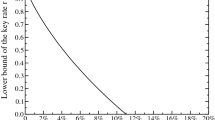Abstract
A simple proof of the unconditional security of a relativistic quantum cryptosystem based on orthogonal states is given. Limitations imposed by the special relativity theory allow the proof to be markedly simplified as compared to the case of nonrelativistic cryptosystems based on nonorthogonal states. An important point in the proposed protocol is a space-time structure of the quantum states, which is ignored in the non-relativistic protocols using only the properties of the space of states of the information carriers. As a consequence, the simplification is related to the inefficacy of using the collective measurements against an eavesdropper, the allowance for which is an especially difficult task in the nonrelativistic case.
Similar content being viewed by others
References
S. Wiesner, SIGACT News 15, 78 (1983).
C. H. Bennett and G. Brassard, in Proceedings of IEEE International Conference on Computers, Systems and Signal Processing, Bangalore, India, 1984, p. 175.
P. W. Shor, in Proceedings 35th Annual Symposium on Foundations of Computer Science, Santa Fe, Ed. by S. Goldwasser (IEEE Comput. Society Press, Los Alamitos, 1994), p. 124.
W. K. Wootters and W. H. Zurek, Nature 299, 802 (1982).
C. H. Bennett, Phys. Rev. Lett. 68, 3121 (1992); C. H. Bennett, G. Brassard, and N. D. Mermin, Phys. Rev. Lett. 68, 557 (1992).
D. Mayers, quant-ph/9802025 (1998).
H.-K. Lo and H. F. Chau, quant-ph/9803006 (1998).
E. Biham, M. Boyer, P. O. Boykin, et al., quant-ph/9912053 (1999).
P. W. Shor and J. Preskill, quant-ph/0003004 (2000).
N. N. Bogolyubov, A. A. Logunov, A. I. Oksak, and I. T. Todorov, General Principles of Quantum Field Theory (Nauka, Moscow, 1987).
A. Kent, quant-ph/9810067 (1998); quant-ph/9810068 (1998); Phys. Rev. Lett. 83, 1447 (1999).
S. N. Molotkov and S. S. Nazin, quant-ph/9911055 (1999); quant-ph/9910034 (1999); R. Laiho, S. N. Molotkov, and S. S. Nazin, quant-ph/0005067 (2000); quant-ph/0005068 (2000).
L. D. Landau and R. Peierls, Z. Phys. 69, 56 (1931); L. D. Landau, in Collection of Works (Nauka, Moscow, 1969), Vol. 1, p. 56.
L. Goldenberg and L. Vaidman, Phys. Rev. Lett. 75, 1239 (1995); quant-ph/9506030 (1995).
A. Peres, quant-ph/9509003 (1995).
M. Koashi and N. Imoto, Phys. Rev. Lett. 79, 2383 (1997).
R. Laiho, S. N. Molotkov, and S. S. Nazin, quant-ph/0006010 (2000).
I. Bialynicki-Birula, Phys. Rev. Lett. 80, 5247 (1998).
C. H. Bennett, D. P. DiVincenzo, J. A. Smolin, and W. K. Wootters, quant-ph/9604024 (1996).
E. J. Mac Williams and N. J. A. Sloane, The Theory of Error-Correcting Codes (North-Holland, Amsterdam, 1977).
Author information
Authors and Affiliations
Additional information
__________
Translated from Zhurnal Éksperimental’no\(\overset{\lower0.5em\hbox{$\smash{\scriptscriptstyle\smile}$}}{l} \) i Teoretichesko\(\overset{\lower0.5em\hbox{$\smash{\scriptscriptstyle\smile}$}}{l} \) Fiziki, Vol. 119, No. 5, 2001, pp. 1001–1010.
Original Russian Text Copyright © 2001 by Molotkov, Nazin.
Rights and permissions
About this article
Cite this article
Molotkov, S.N., Nazin, S.S. A simple proof of unconditional security of relativistic quantum cryptography. J. Exp. Theor. Phys. 92, 871–878 (2001). https://doi.org/10.1134/1.1378181
Received:
Issue Date:
DOI: https://doi.org/10.1134/1.1378181




